Over the past week, the media concentrated on German Chancellor Olaf Scholz’s visit to the region. They not only discussed his attendance at the 2nd Germany-Central Asia (Z5+1) summit but, crucially, the new migration pact he signed with Uzbekistan that enables Germany to deport Afghanistani migrants via Uzbekistan. Several outlets also noted that Kyrgyzstan’s trade with China totaled $11 billion over the first seven months of the year. They also remarked on various new investments in waste-to-energy projects in Uzbekistan, the Chatkal HPP and wind farms in Kyrgyzstan, and the progress on the planned Turkmenistan-Afghanistan-Pakistan-India (TAPI) pipeline. Other sources mentioned the Hungarian foreign minister’s visit to Kyrgyzstan and the 12th meeting of the Kazakhstan-Georgia Intergovernmental Commission on Trade and Economic Cooperation.
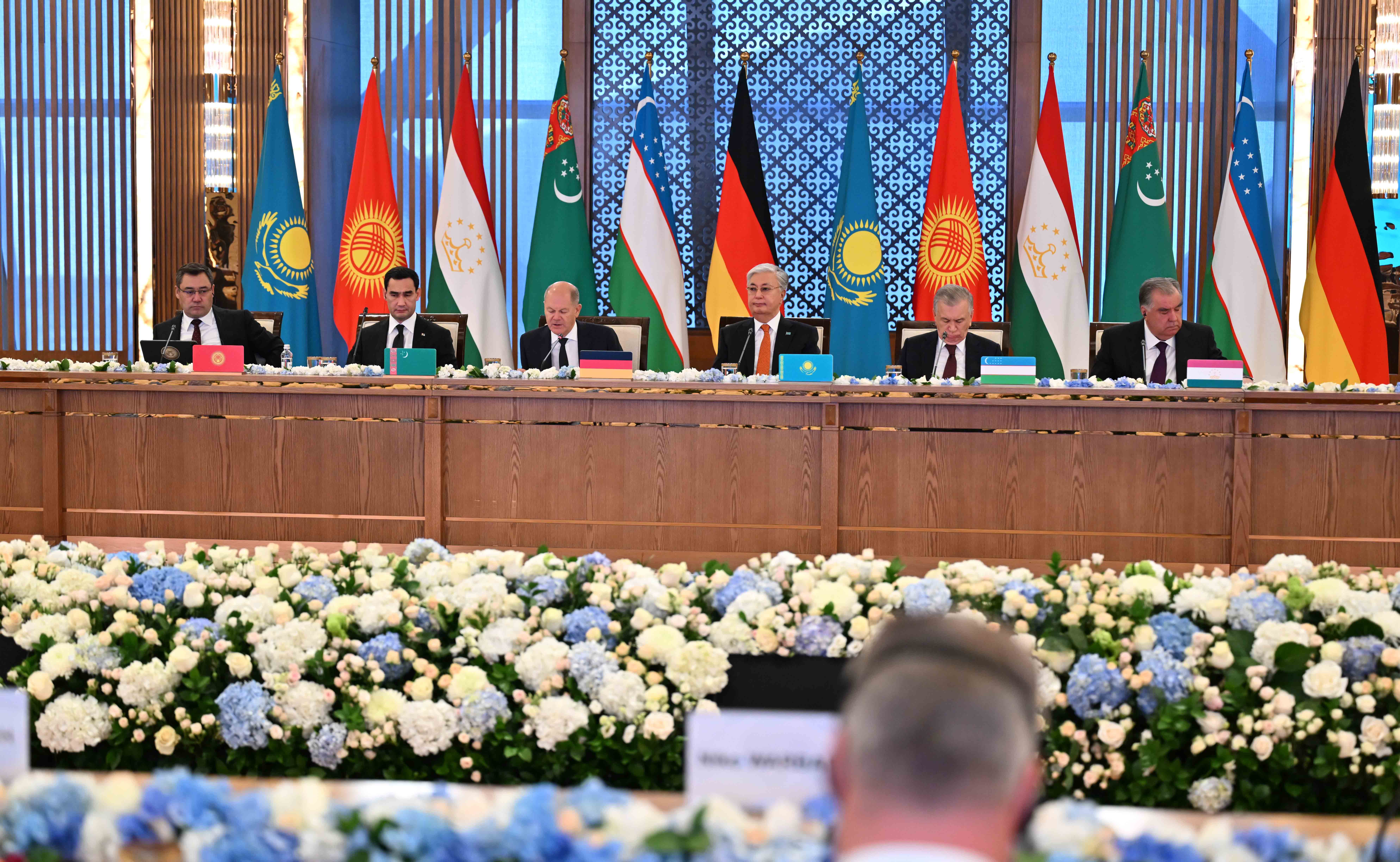
The 2nd Germany-Central Asia summit in Astana. Source: Akorda
Diplomatic Events
On September 15, German Chancellor Olaf Scholz arrived in Samarkand, Uzbekistan, for the first leg of his three-day trip to Central Asia. He held talks with Uzbekistani President Shavkat Mirziyoyev. He also signed a new migration agreement that will streamline the legal migration of skilled workers from Uzbekistan to Germany and oblige Tashkent to accept the return of those living in Germany illegally (Kun). There has also been speculations that under the deal, Germany would also deport Afghanistani migrants to Uzbekistan for later repatriation to Afghanistan. However, when asked by the media, Scholz did not respond to questions about the matter (Reuters). In June, Der Spiegel reported that Germany was negotiating a new migration agreement with Uzbekistan that would include the deportation of Afghanistani migrants via Uzbekistan. According to initial reports, Uzbekistan had promised to help with the deportations (Kun). According to reporting from Gazeta.uz, Article 11 of the agreement “defines the conditions for the readmission of third-country nationals and stateless persons illegally residing in the territory of two countries” (Gazeta.uz).
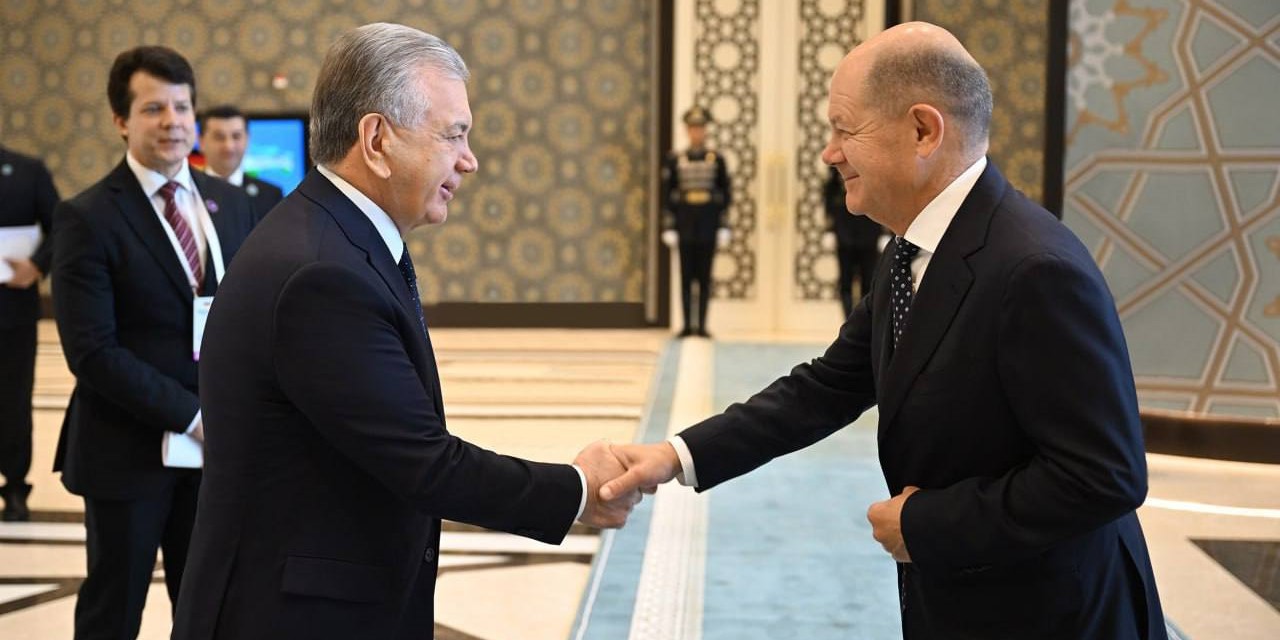
Caption: German Chancellor Olaf Scholz begins his 3-day visit to Central Asia in Samarkand. Source: Uzbekistan's Presidential Press Office
From September 16-17, German Chancellor Olaf Scholz visited Astana, where he met with Kazakhstani President Kassym-Jomart Tokayev (The Astana Times). Welcoming Chancellor Scholz, President Tokayev stated, “I am sure that we will give a very serious impetus to the development of our cooperation and increase bilateral trade. This is very important because Germany is one of our main European and even global partners.” During the meeting, the two leaders discussed ongoing efforts to bring about a peaceful solution to the war in Ukraine. Tokayev commented: “It is a fact that, from a military standpoint, Russia is invincible. Further escalation of the war will lead to irreparable consequences for all of humanity, and, above all, for the countries directly involved in the Russian-Ukrainian conflict. Unfortunately, a good opportunity to reach at least a ceasefire was missed with the refusal to sign the Istanbul Agreement” (Kazinform).
Scholz also attended the 2nd Germany-Central Asia summit meeting with the leaders of the five Central Asian countries (Kazakhstan Newsline). During the meeting, much of the discussion was devoted to trade, investments, energy, ecology, transport, and logistics (Kun). A particular focus was given to developing the Middle Corridor and energy relations. The visit comes amid German attempts to diversify its energy supply away from Russia by seeking other suppliers, such as the countries of Central Asia. In relation to the Middle Corridor, Uzbekistani President Mirziyoyev had also noted its increasing importance in facilitating growing trade, echoing Kazakhstani Prime Minister Olzhas Bektenov, who recently expressed Kazakhstan’s desire to increase trade volumes along the route to 10 million tons (The Astana Times).
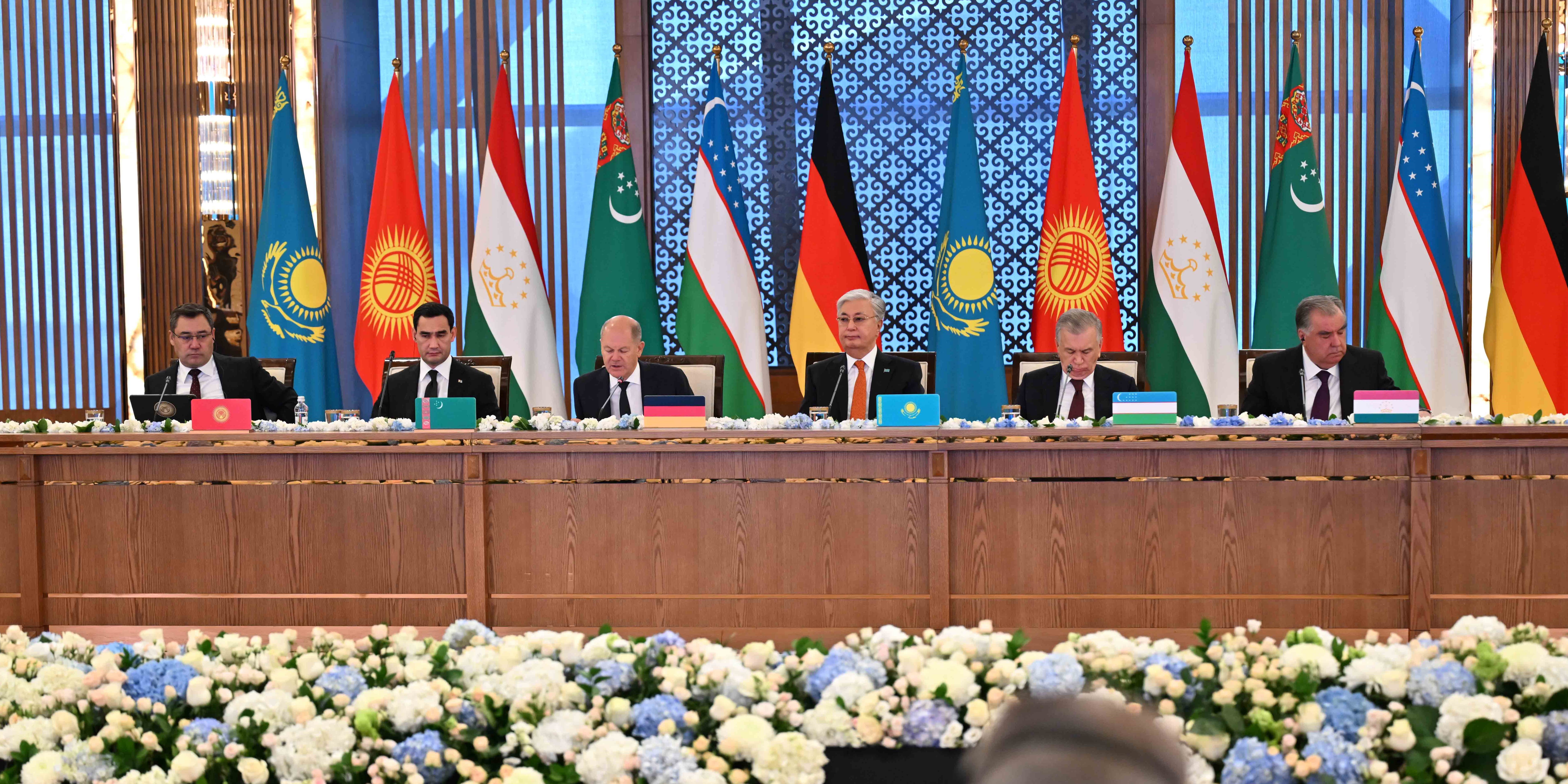
The 5 Central Asian leaders and German Chancellor Scholz attended the 2nd Germany-Central Asia summit in Astana. Source: Akorda
On September 19, the Hungarian Foreign Minister, Peter Szijjártó, arrived in Kyrgyzstan on an official visit. He attended the 4th meeting of the Hungarian-Kyrgyzstani Strategic Council with his Kyrgyzstani counterpart, Foreign Minister Jeenbek Kulubayev (AKIpress). The two sides discussed strengthening ties and the activities of the Kyrgyzstani-Hungarian Development Fund as well as the Intergovernmental Commission on Economic Cooperation. The Minister also agreed to increase the charter capital of the Development Fund to $50 million (AKIpress).
Trade
At the 16th meeting of the intergovernmental Kyrgyzstani-Chinese Commission on Trade and Economic Cooperation in Beijing, the Deputy Chairman of the Cabinet of Ministers of Kyrgyzstan, Bakyt Torobaev, noted that China-Kyrgyzstan trade amounted to $11 billion between January and July of this year (Kabar). In 2023, trade between the two countries totaled $20 billion, an increase of 32% compared to 2022. The Minister noted progress on the construction of the China-Kyrgyzstan-Uzbekistan railway and the opening of the Bedel border crossing. The Deputy Chairman held discussions with Chinese customs, trade, and transport officials, with both sides agreeing to increase the quota for trucks at the border crossings to 40000 vehicles. Finally, they elaborated on constructing the Barskoon — Uchturfan — Aksu highway and modernizing border infrastructure (24.kg).
At the 12th meeting of the Kazakhstan-Georgia Intergovernmental Commission on Trade and Economic Cooperation, Kazakhstani Prime Minister Olzhas Bektenov and First Deputy Minister and Minister of Economy and Sustainable Development of Georgia Levan Davitashvili discussed issues of trade, investment, and logistics between the two countries (The Office of Kazakhstan’s Prime Minister). In The first quarter of this year, Georgian investment in Kazakhstan reached $88.5 million. Both Ministers discussed opportunities in transport and logistics, specifically the development of the Trans-Caspian international transport route. Prime Minister Bektenov noted, “Cargo transshipment along this route grew by 65% last year and by 69% in the first 8 months of this year, reaching 2.9 million tonnes.” Both parties also emphasised increasing digitalisation and reducing delivery times on the Baku-Tbilisi-Kars railway (The Astana Times).
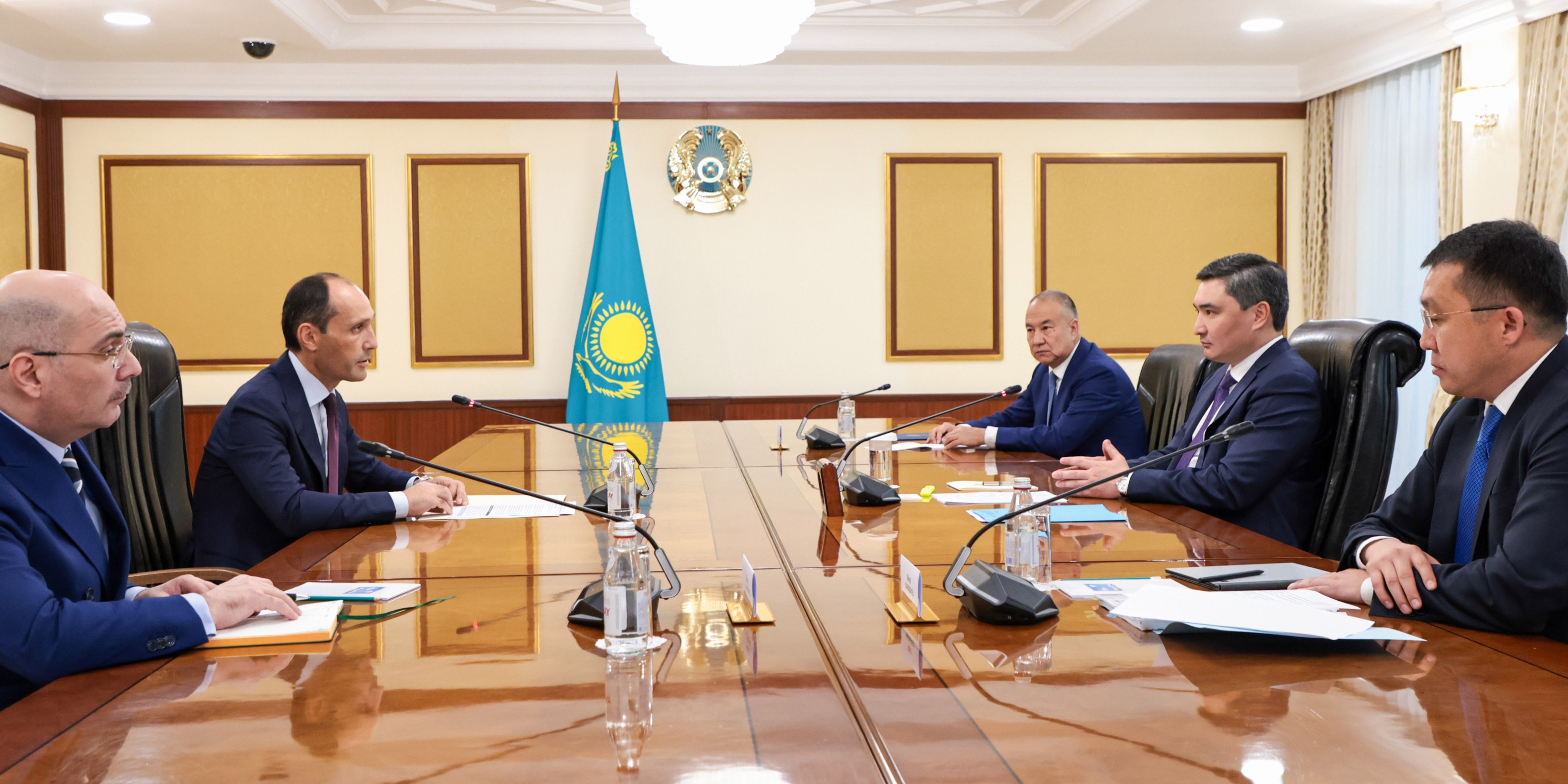
PM Olzhas Bektenov met with First Deputy Prime Minister – Minister of Economy and Sustainable Development of Georgia Levan Davitashvili, who arrived in Astana to participate in the 12th meeting of the Kazakhstan-Georgia Intergovernmental Commission on Trade and Economic Cooperation. Source: Prime Minister’s Office
Investment
During the German Chancellor Olaf Scholz’s visit to Samarkand, he discussed several industrial and infrastructural projects worth a total of €9 billion with his Uzbekistani counterpart, Shavkat Mirziyoyev (Daryo). The discussions primarily centered around several construction, energy, and engineering initiatives. For instance, Siemens will lead the construction of combined cycle power plants in the country. The Linde Group will also participate in a joint initiative to produce ammonia and methanol. Finally, KfW Ipex-Bank and Giga Fiber will invest in mining and processing of the increasingly critical mineral copper. Since the beginning of this year, German firms have invested over $800 million in Uzbekistan (Gazeta.uz).
In Astana, Chancellor Scholz met Kazakhstani President Kassym-Jomart Tokayev to discuss the enhancement of bilateral relations. President Tokayev noted that German-Kazakhstani trade increased by 13% over the first seven months of this year and that German investments in Kazakhstan last year amounted to $770 million. As part of the visit, a business forum was held in Astana, where German and Kazakhstani officials signed 36 agreements on various joint projects, such as the construction of a new container terminal at the port of Aktau on the Caspian Sea, worth a total of $6.3 billion (The Astana Times).
The Turkmenistani foreign minister, Rashid Meredov, announced that Turkmenistan has invested $1.5 billion in joint infrastructure projects with Afghanistan (Amu). During a bilateral meeting to discuss the development of trade ties, the minister also urged other regional partners like India, China, the Asian Development Bank, and the United Nations, whose representatives were in attendance, to support these projects, especially the Turkmenistan-Afghanistan-Pakistan-India (TAPI) pipeline. Earlier reporting highlighted the efforts of Central Asian countries to normalize relations with Afghanistan by enhancing economic cooperation and removing the Taliban from their respective lists of extremist organizations.
The Asian Development Bank (ADB) has provided Uzbekistan with a $300 million loan to expand access to financial services (Gazeta.uz). Kanokpan Lao-Araya, ADB Country Director for Uzbekistan, stated: “With this loan, ADB is expanding its partnership with Uzbekistan to provide entrepreneurs, particularly women, with equal access to financial products and services. This will help improve their lives and secure additional livelihoods.” According to the ADB, state-owned banks dominate the Uzbekistani financial services sector, with micro-finance institutions that provide inclusive finance accounting for only 0.5% of the market. According to the 2021 Global Findex report, only 44% of Uzbekistanis have a formal bank account, significantly lower than the 58% average in Central Asia (The Times of Central Asia). This initiative aims to reduce this credit gap for small and medium enterprises and boost economic growth.
Kazakhstan and China will open a new $1 billion rail border crossing by 2027 (Daryo). The new crossing will be located near the town of Bakhty and will also include constructing the new 272 rail line. The new crossing will have an annual capacity of 20 million tons and will help to alleviate congestion at the Dostyk and Atynkol crossings. Over the past year, the congestion temporarily forced Kazakhstan to halt grain and container shipments to China.
The Kazakhstani President, Kassym-Jomart Tokayev, ratified an agreement between Kazakhstan and Kyrgyzstan, which was signed by both parties on June 9, 2023, to construct a trade and logistics complex near the Karasu and Ak Tilek border crossings (Kazinform). Earlier this month, it was ratified by the Kazakhstani Senate. This new project will further facilitate the processing, storage, and transportation of goods between the two countries.
Energy
The Andijan regional administration in Uzbekistan and the Chinese construction firm Jin Ming have signed a memorandum on a $250 million waste incineration project (Kun). The memorandum was signed at the International Investment and Trade Forum in China, and construction will begin as early as next month. Both sides also discussed several other projects worth $100 million. Earlier this year, the Chinese company CAMCE signed a similar memorandum to construct the country’s first waste-to-energy project. Furthermore, an American company, Sayar, plans to produce energy from medical waste, starting from later this year. This week, the Uzbekistani Ministry of Ecology signed an agreement with China Everbright Environment Group to construct similar projects in Fergana and Namangan regions (Kun).
Director of the National Investment Agency Talantbek Imanov informed journalists that at least $213 million will be invested in the small Chatkal HPPs (24.kg). He noted that several public-private partnerships had been concluded regarding their construction. The project will involve the building of four small HPPs with a total capacity of 160 megawatts. This comes amid Kyrgyzstan’s ongoing efforts to boost its green energy production and exports. Earlier, we reported on the Rosatom commencing construction on a 100MW wind farm near Issyk-Kul. This week, the Chinese-Russian Investment Company announced plans to construct the country’s second wind farm with a capacity of 150MW near Dostuk village in the Batken region (AKIpress).
Environment
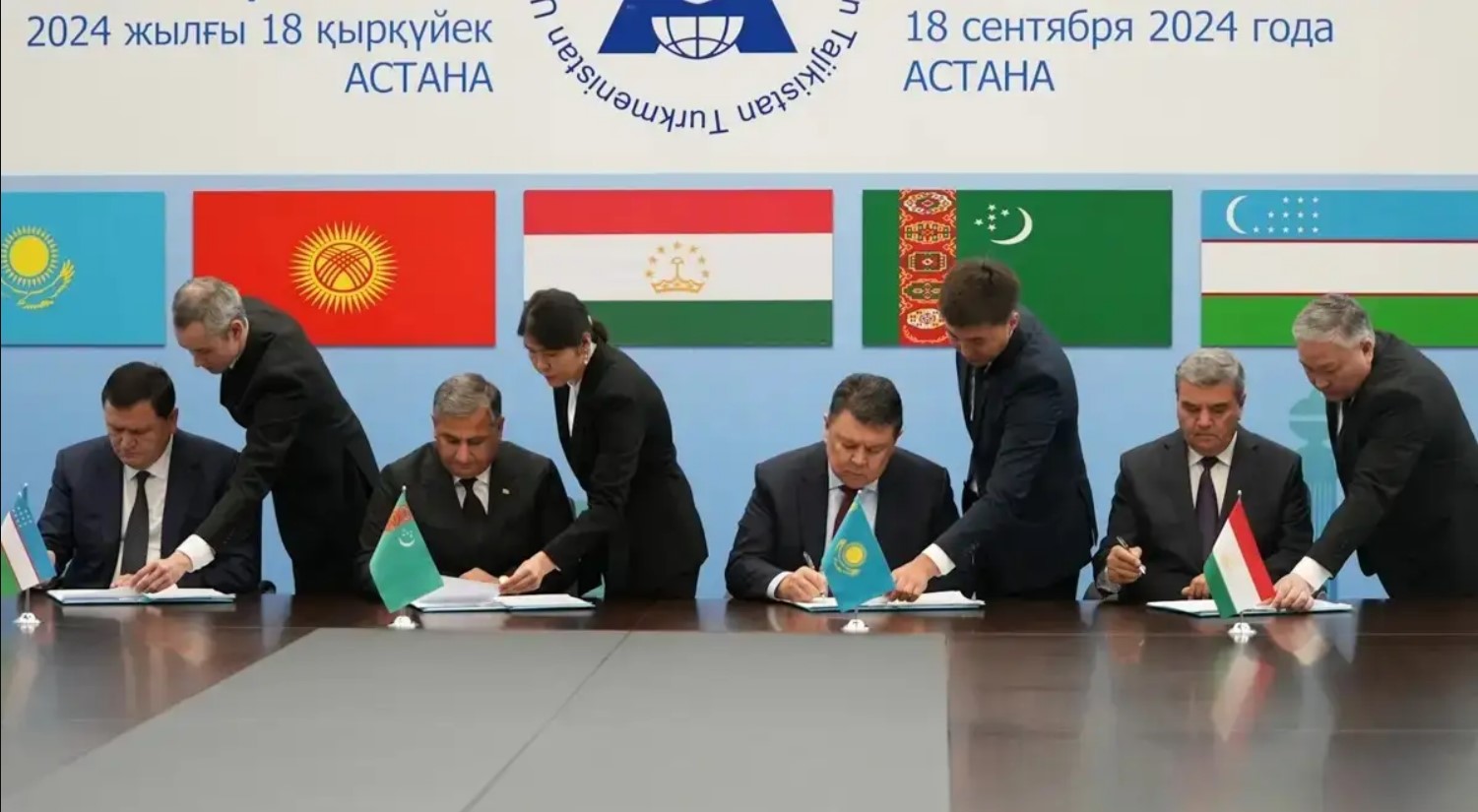
The 1st meeting of the Executive Board of the International Fund for Saving the Aral Sea (IFAS) took place in Astana. Source: Kaz Inform
The 1st meeting of the Executive Board of the International Fund for Saving the Aral Sea (IFAS) occurred in Astana (Kazinform). The meeting focused on the usage of transboundary water resources in the Aral Sea region. The IFAS was established in 1993 to attenuate the effects of the deterioration of the Aral Sea. During the meeting, Kazakhstan proposed the Aral Sea Saving Action Plan, which includes two large-scale projects: Aral Sea Basin Assistance Program (ASBP) and the Regional Program for Environmental Protection for Sustainable Development in Central Asia. These efforts come amid Kazakhstan’s attempts to plant trees and other plants in the Aral Sea basin to reduce desertification in the region (Kazinform). For instance, President Tokayev has instructed that 1.1 million hectares should be planted between 2021 and 2025.

